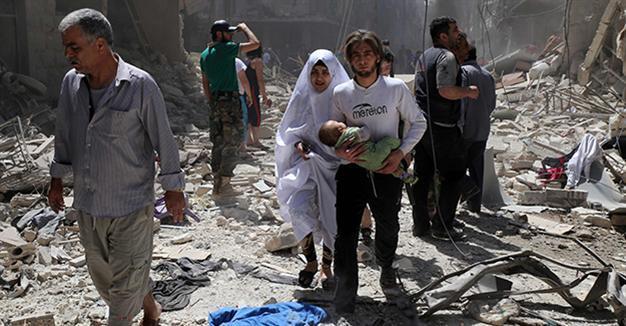38 civilians dead in rebel, regime attacks in Syria’s Aleppo
BEIRUT – Agence France-Presse

A Syrian family walks amid the rubble of destroyed buildings following a reported airstrike on April 28, 2016 in the Bustan al-Qasr rebel-held district of the northern Syrian city of Aleppo - AFP photo
At least 38 civilians were killed and dozens more wounded in fresh violence in both rebel-held and government-held neighborhoods of Syria’s northern city of Aleppo on April 28, a monitoring group said, while the U.N. Special Envoy for Syria Staffan de Mistura called for the U.S. and Russia to engage in a high-level meeting to maintain the almost broken cease-fire.Rebel rocket and artillery fire on government-held neighborhoods killed 18 civilians on April 28, the Syrian Observatory for Human Rights said.
Two children were among the dead, and about 40 people were wounded.
Regime air strikes on rebel-held districts, including the heavily populated Bustan al-Qasr neighborhood, killed 20 civilians, the Observatory said.
An upsurge in fighting in Aleppo, Syria’s pre-war commercial hub, has killed at least 186 people since April 22, the Britain-based group said.
An AFP correspondent in the city said the barrage of air strikes began early in the morning.
Rescue workers in the city - known as White Helmets - said they were exhausted by the escalation in violence.
“We were still working on the air strikes from last night in the Sukkari neighborhood,” one volunteer told AFP.
Overnight raids on the rebel-held neighborhood hit a hospital and a nearby block of flats killing at least 30 people, the White Helmets said.
Among the dead was the last pediatrician still working in rebel areas of the city.
Hours before the airstrikes, de Mistura called on the leaders of the United States and the Russian Federation to salvage the “barely alive” two-month-old ceasefire in Syria and revitalize the damaged peace process.
De Mistura voiced deep concern at the truce unravelling in Aleppo and at least three other hotspots, although he saw some narrowing of positions between the government and opposition visions of political transition.
“Hence my appeal for a U.S.-Russian urgent initiative at the highest level, because the legacy of both [U.S.] President [Barack] Obama and [Russian] President [Vladimir] Putin is linked to the success of what has been a unique initiative which started very well. It needs to end very well,” de Mistura told a news conference.
The United States and Russia must convene a ministerial meeting of major and regional powers who compose the International Syria Support Group (ISSG), he said.
“There is no reason that both of them which have been putting so much political capital in that success story and have a common interest in not seeing Syria ending up in another cycle of war should not be able to revitalize what they have created and which is still alive but barely.”
The main opposition High Negotiations Committee (HNC) pulled out of the formal talks a week ago, in protest of intensified fighting and slow aid deliveries.
“How can you have substantial talks when you have only news about bombing and shelling? It’s something that even I find it difficult, can you imagine the Syrians?” de Mistura said, adding he aimed to resume talks in May, though he gave no date.
















